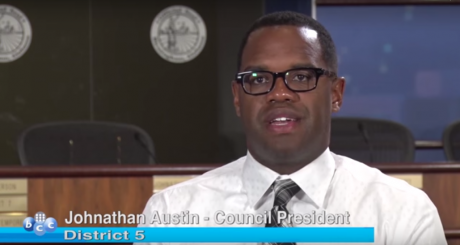
In a video released last week by the Birmingham City Council, Johnathan Austin outlines the requirements put forth by the city for rideshare companies like Uber. Photo courtesy of Birmingham City Council.
Birmingham City Council President Johnathan Austin already has the Uber app installed on his phone.
On Monday Austin said he is optimistic the $51 billion rideshare company will eventually reach an agreement with the city and begin operations. But, according to Austin, Uber representatives have not yet contacted city officials regarding the issues that have thus far kept the company out of Birmingham.
Both Uber and city officials appear to be waiting on the other to begin the negotiations.
“We have not spoken to them,” Austin said over the phone. “We will do whatever we need to do to bring them in town, but until we talk to them we don’t know what it is they want.”
Last week, the Birmingham City Council released a video in which Austin said the council is, “begging Uber to come to our city.”
“We absolutely want Uber to come to Birmingham, and we are looking forward to the day that we can get on our phones and use the app to get a ride,” Austin said in the video. “The only thing that we are asking from Uber is the same thing we ask from every other cab company or driver-for-hire in our city: submit to a background check, make sure they have proper liability insurance and to make sure they have a business license to operate legally in the city of Birmingham.”
After watching the minute-long video released by the council, an Uber representative responded. “We welcome the opportunity to talk through our existing safety mechanisms in place like extensive background checks on all driver-partners and primary commercial insurance coverage on all trips, and why they make sense for ridesharing’s business model,” the representative said. “We hope the Council will consider the regulatory frameworks put forth by more than 50 US jurisdictions — including 22 states — that have created new rules for this innovative transportation alternative.”
Kaitlin Durkosh, who works on Uber’s communication team, expanded on some of Birmingham’s regulations that Uber has taken issue with.
“Those issues in the video are not quite as simple as they are written in the existing Birmingham ordinance for ridesharing,” Durkosh said. “The way it is written now it says Uber’s driving partners are required to have 24/7 commercial insurance like taxis. But with ridesharing, most of our driver partners are part-time. They may only drive a couple hours a week or as a side job.”
Durkosh said it is important to note that unlike taxi drivers, Uber partners are using their personal vehicles to provide rides. “So to require them to have 24/7 commercial insurance even when they may be dropping their kids off at school or picking up groceries just doesn’t make sense.”
Austin said that he has used Uber several times when he was visiting other cities and had nothing but praise for the service he was provided.
“My personal experience with them has been fantastic,” Austin said. “I’ve never had a bad experience with them, and I’ve never rated a driver less than four stars. If my personal history with Uber is any indicator of what they will be like with the rest of the city, then I know they will be a welcome addition to the transportation options we have here.”
Beyond Personal History
Last summer, the Birmingham City Council approved new regulations that Uber claimed were not compatible with the company’s business framework, including, but not limited to, the commercial insurance requirement.
A year later, Austin said no further discussion has taken place between the city and the company. The three requirements listed in the city council’s video are the same three points of contention that caused Uber to skip town last July.
One issue that Austin has taken with Uber is that he claims the company has lambasted the city through various media outlets without ever reaching out and discussing the issues with the city.
“For lack of a better word, [Uber has] been intimidating elected officials in various markets that they are trying to get to and they don’t feel like they can reach a reasonable resolution with. They try and go in through their media campaign and strike up all these different conversations,” Austin said. “That’s not the best way to start a relationship.”
Members of the public have not been shy about voicing their opinions about having more transportation options in Birmingham. Imperfections in Birmingham’s taxi options came to light several weeks ago when Birmingham hosted the inaugural Sloss Music and Arts Festival, which brought thousands to the downtown area.
It was because of this “flawed system” that Charles Kessler decided to take action. As vice chair of the Libertarian Party of Alabama, Kessler said that despite the delays and the bureaucratic red tape, this is still something people in Birmingham are pushing for. “You can’t kill an idea,” Kessler said. “If the idea is good and people want it, then they are going to get it.”
“Last weekend I was at my parent’s lake house, and I was going through my Facebook feed and I saw a post by our social media expert that was talking about Sloss Fest and SEC Media Days and how people were upset that they weren’t able to get the kind of transportation options they needed to get around,” Kessler said.
Kessler saw this as an opportunity to organize an event to ramp up support for Uber and other rideshare companies in Birmingham. Last Friday, the LPA held a rally in front of Birmingham City Hall in which people were able to sign a petition that was handed over to the city.
Kessler said the turnout was not what he would have hoped for, although his group was able to get about 950 signatures for the petition. “I got really excited and wanted to do this quickly and in retrospect, we were a little rushed,” Kessler said of the week leading up to the rally. Despite a meager turnout, Kessler said he is planning on holding another rally, this time on a Tuesday morning when the Birmingham City Council holds its weekly meetings.
In reference to the last week’s city council’s video plea, “[Austin] can say he wants Uber all he wants, but until he makes some moves to make that happen, it seems that they don’t want Uber here,” Kessler said.
Uber representatives also seem to think that the onus is on the Birmingham City Council to make the first move.
“We hope that once the city council reviews the 50-plus regulatory frameworks from around the country that have seen very similar processes, they will realize that maybe what they’ve already written in their existing laws isn’t conducive to the unique ridesharing business model,” Durkosh said.
“We are eager to sit down with them and talk through some of these issues once again,” Durkosh continued. “It seems like there has been a lot more public pressure now to bring Uber’s ridesharing to Birmingham. Hopefully they will realize that trying to group us in with taxis isn’t going to work.”
Both sides said they are unclear on when negotiations might begin.




